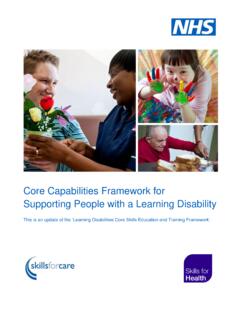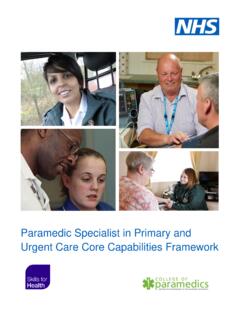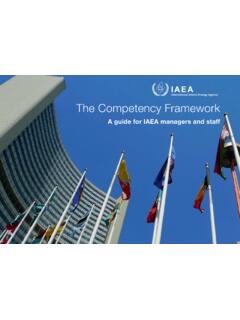Transcription of Erasmus+
1 In the case of conflicting meanings between language versions, the English version prevails. Version 1 (2022): 24-11-2021 Erasmus+ Programme Guide 2 Table of Contents PART A GENERAL INFORMATION ABOUT THE ERASMUS+ PROGRAMME .. 4 WHAT ARE THE OBJECTIVES AND IMPORTANT FEATURES OF THE ERASMUS+ PROGRAMME? .. 6 PRIORITIES OF THE ERASMUS+ PROGRAMME .. 7 Part B INFORMATION ABOUT THE ACTIONS COVERED BY THIS GUIDE .. 35 KEY ACTION 1: LEARNING MOBILITY OF INDIVIDUALS .. 37 MOBILITY PROJECT FOR HIGHER EDUCATION STUDENTS AND STAFF .. 40 ERASMUS ACCREDITATION IN THE FIELDS OF VOCATIONAL EDUCATION AND TRAINING, SCHOOL EDUCATION AND ADULT EDUCATION .. 75 MOBILITY FOR LEARNERS AND STAFF IN VOCATIONAL EDUCATION AND TRAINING .. 83 MOBILITY FOR PUPILS AND STAFF IN SCHOOL EDUCATION .. 99 MOBILITY FOR LEARNERS AND STAFF IN ADULT EDUCATION .. 113 LEARNING MOBILITY IN THE FIELD OF YOUTH.
2 127 ERASMUS ACCREDITATION IN THE FIELD OF YOUTH .. 128 MOBILITY OPPORTUNITIES FOR ACCREDITED ERASMUS ORGANISATIONS IN THE FIELD OF YOUTH .. 134 MOBILITY PROJECTS FOR YOUNG PEOPLE - YOUTH EXCHANGES .. 136 MOBILITY PROJECTS FOR YOUTH WORKERS .. 149 YOUTH PARTICIPATION ACTIVITIES .. 162 MOBILITY PROJECTS FOR YOUNG PEOPLE - DISCOVEREU INCLUSION ACTION .. 178 VIRTUAL EXCHANGES IN HIGHER EDUCATION AND YOUTH .. 188 KEY ACTION 2: COOPERATION AMONG ORGANISATIONS AND INSTITUTIONS .. 196 PARTNERSHIPS FOR COOPERATION .. 199 COOPERATION PARTNERSHIPS .. 207 SMALL-SCALE PARTNERSHIPS .. 215 PARTNERSHIPS FOR EXCELLENCE .. 223 CENTRES OF VOCATIONAL EXCELLENCE .. 224 ERASMUS+ TEACHER ACADEMIES .. 235 ERASMUS MUNDUS ACTION .. 242 PARTNERSHIPS FOR INNOVATION .. 257 ALLIANCES FOR INNOVATION .. 258 FORWARD-LOOKING PROJECTS .. 275 CAPACITY BUILDING IN HIGHER EDUCATION .. 292 CAPACITY BUILDING IN THE FIELD OF VOCATIONAL EDUCATION AND TRAINING (VET).
3 309 CAPACITY BUILDING IN THE FIELD OF YOUTH .. 317 CAPACITY BUILDING IN THE FIELD OF SPORT .. 325 NOT-FOR-PROFIT EUROPEAN SPORT EVENTS .. 332 3 KEY ACTION 3: SUPPORT TO POLICY DEVELOPMENT AND COOPERATION .. 338 EUROPEAN YOUTH 340 JEAN MONNET ACTIONS .. 349 JEAN MONNET ACTIONS IN THE FIELD OF HIGHER EDUCATION .. 350 JEAN MONNET ACTIONS IN OTHER FIELDS OF EDUCATION AND TRAINING .. 365 JEAN MONNET POLICY DEBATE .. 374 PART C INFORMATION FOR APPLICANTS .. 383 PART D GLOSSARY OF TERMS .. 405 4 PART A GENERAL INFORMATION ABOUT THE ERASMUS+ PROGRAMME Erasmus+ is the EU Programme in the fields of education, training, youth and sport for the period 2021-2027. Education, training, youth and sport are key areas that support citizens in their personal and professional development. High quality, inclusive education and training, as well as informal and non-formal learning, ultimately equip young people and participants of all ages with the qualifications and skills needed for their meaningful participation in democratic society, intercultural understanding and successful transition in the labour market.
4 Building on the success of the programme in the period 2014-2020, Erasmus+ strengthens its efforts to increase the opportunities offered to more participants and to a wider range of organisations, focusing on its qualitative impact and contributing to more inclusive and cohesive, greener and digitally fit societies. European citizens need to be better equipped with the knowledge, skills and competences needed in a dynamically changing society that is increasingly mobile, multicultural and digital. Spending time in another country to study, to learn and to work should become the standard, and the opportunity to learn two other languages in addition to one s mother tongue should be offered to everyone. The Programme is a key component supporting the objectives of the European Education Area, the Digital Education Action Plan 2021-2027, the European Union Youth Strategy and the European Union Work Plan for Sport (2021-24).
5 As the COVID-19 pandemic has shown, access to education is proving, more than ever, to be essential to ensuring a swift recovery, while promoting equal opportunities for all. As part of this recovery process, the Erasmus+ programme takes its inclusive dimension to a new horizon by supporting opportunities for personal, socio-educational and professional development of people in Europe and beyond, with the aim of leaving no-one behind. To increase the qualitative impact of its actions and ensure equal opportunities, the Programme will reach out more and better to people of different ages and from diverse cultural, social and economic backgrounds. It is at the heart of the Programme to come closer to those with fewer opportunities, including people with disabilities and migrants, as well as European Union citizens living in remote areas or facing socio-economic difficulties.
6 In doing so, the Programme will also encourage its participants, in particular young people to engage and learn to participate in civic society, raising awareness about European Union common values. The Programme will continue to empower young people and to encourage their participation in democratic life, particularly through supporting activities linked to the European Year of Youth 2022, which was announced in the State of the Union address in September 2021. Furthermore, developing digital skills and competences and skills in forward-looking fields, such as combating climate change, clean energy, artificial intelligence, robotics, big data analysis, etc. is essential for Europe's future sustainable growth and cohesion. The Programme can make a meaningful contribution by stimulating innovation and bridging Europe's knowledge, skills and competences gap.
7 EU businesses need to become more competitive through talent and innovation. This investment in knowledge, skills and competences will benefit individuals, institutions, organisations and society as a whole by contributing to sustainable growth and ensuring equity, prosperity and social inclusion in Europe and beyond. Another challenge relates to the Europe-wide trends of limited participation in democratic life and low levels of knowledge and awareness about European matters and their impact on the lives of all European citizens. Many people are reluctant, or face difficulties, in actively engaging and participating in their communities or in the European Union's political and social life. Strengthening European identity and the participation of young people in democratic processes is of paramount importance for the European Union's future.
8 This issue can also be targeted through non-formal learning activities, which aim at enhancing the skills and competences of young people as well as their active citizenship. 5 In line with the European Union s priorities in making sustainable its economy, projects should be designed in an eco-friendly manner and should incorporate green practices in all facets. Organisations and participants involved should have an environmental-friendly approach when designing their projects, which will encourage them to discuss and learn about environmental issues, make them think about what can be done at their level and help them come up with alternative greener ways of implementing their activities. Supporting and facilitating the transnational and international cooperation between organisations in the fields of education, training, youth and sport is essential to empowering people with more key competences, reducing early school leaving and recognising competences acquired through formal, informal and non-formal learning.
9 It facilitates the circulation of ideas and the transmission of best practices and expertise and the development of digital capabilities thus contributing to a high quality education while strengthening social cohesion. The Erasmus+ Programme is one of the European Union s most visible success stories. It builds on the achievements of more than 30 years of European programmes in the fields of education, training, youth and sport, covering both an intra-European as well as an international partnerships dimension. The Erasmus+ Programme Guide is drafted in accordance with the Erasmus+ annual Work Programme adopted by the European Commission, and therefore may be revised to reflect the priorities and lines of action defined in the Work Programmes adopted in the following years. The implementation of this Guide is also subject to the availability of the appropriations provided for in the draft budget after the adoption of the budget for the year by the EU Budgetary Authority or as provided for in the system of provisional twelfths.
10 6 WHAT ARE THE OBJECTIVES AND IMPORTANT FEATURES OF THE ERASMUS+ PROGRAMME? GENERAL OBJECTIVE The general objective of the Programme is to support, through lifelong learning, the educational, professional and personal development of people in education, training, youth and sport, in Europe and beyond, thereby contributing to sustainable growth, quality jobs and social cohesion, to driving innovation, and to strengthening European identity and active citizenship. As such, the Programme shall be a key instrument for building a European Education Area, supporting the implementation of the European strategic cooperation in the field of education and training, with its underlying sectoral agendas. In addition, it is key in advancing youth policy cooperation under the European Union Youth Strategy 2019-2027 and developing the European dimension in sport.








